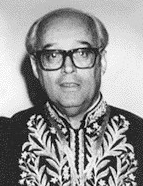

The 1960s signalled a new emphasis in José Honório Rodrigues' intellectual production; previously limited to short articles, his work now also centred on interpreting the broad and enduring aspects of Brazil’s historical trajectory, both past and present. It resulted in two essayistic works that were widely published and successively reprinted: Brasil e África [Brazil and Africa] (1961), with 10,000 copies; and Aspirações nacionais [National aspirations] (1963), with 20,000 copies, both translated into English (Brazil and Africa, Berkeley/Los Angeles, University of California Press, 1965; and The Brazilians–their character and aspirations. Austin, University of Texas Press, 1967). But it was certainly with Conciliação e reforma no Brasil [Conciliation and reform in Brazil], in 1965, that this emphasis was consolidated, although without implying the abandonment of his concerns with the history of historiography, as evidenced by the publication, still in 1965, of História e historiadores do Brasil [History and historians of Brazil] (São Paulo, Fulgor, 1965). A third element would emerge from his studies of Brazil's international relations, marked by proposals for political intervention, as seen in Interesse nacional e política externa [National interest and foreign policy] and Vida e história [Life and history], both published in 1966. These works were followed, four years later, by a new book focusing on the writing of history: História e historiografia [History and historiography] (Petrópolis, Vozes, 1970). The new decade saw a historian prepared to devote a significant portion of his attention to the history of Brazil's Independence and the Empire, marked by the publication of three works on the subject: A assembleia constituinte [The constituent assembly of 1823] (Petrópolis, Vozes, 1974), Independência: revolução e contra-revolução [Independence: revolution and counter-revolution], in 5 volumes (1975-76), and Conselho de Estado: o Quinto Poder? [Council of State: the Fifth Power?] (Brasília, Senado Federal, 1978). In 1979, História da História do Brasil. 1a Parte: A historiografia colonial [History of the History of Brazil. Part 1: Colonial historiography] (São Paulo, Companhia Editora Nacional, 1979) would consist of a systematisation of several of his previous research concerns dating back to the 1940s. Before his death in 1987 (and his professional incapacitation due to a stroke months earlier), Rodrigues would still produce four books, which included articles and essays, most of which had been previously published: História, corpo do tempo [History, the body of time] (São Paulo, Perspectiva, 1976), História combatente [Combatant history] (Rio de Janeiro, Nova Fronteira, 1982), Filosofia e História [Philosophy and History] (Rio de Janeiro, Nova Fronteira, 1982), and História viva [Living history] (São Paulo, Global, 1985). José Honório Rodrigues would have books published even after 1987, starting with História da História do Brasil. A metafísica do latifúndio: o ultra-reacionário Oliveira Viana [History of the History of Brazil.
This work is financed by national funds through FCT - Foundation for Science and Technology, I.P, in the scope of the projects UIDB/04311/2020 and UIDP/04311/2020.
